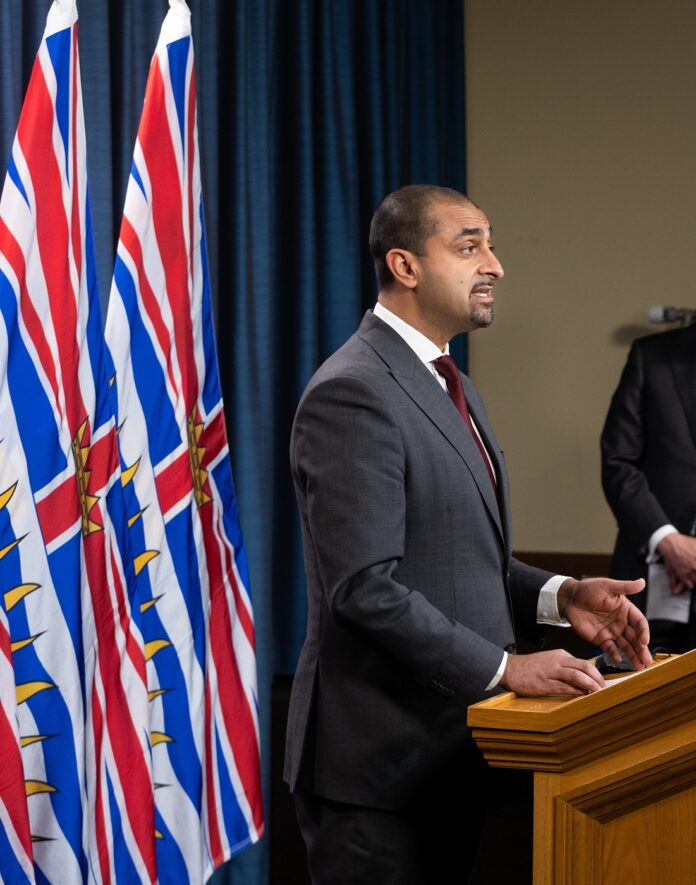NEW regulations will make it easier for people living in strata developments to request electric-vehicle (EV) charging stations where they live.
“Lack of access to electric-vehicle charging should not be a deterrent to people wanting to purchase or rent in a strata complex, which for some is a more affordable housing option,” said Ravi Kahlon, Minister for Housing, on Wednesday. “We’re ensuring that people living in strata developments have a process to request access to electric-vehicle charging, while also helping stratas to plan for and manage electrical capacity. We’re considering future need, adapting to climate change and building a low-carbon B.C.”
The regulations outline a process for a homeowner in a strata to request to install an EV charging station and determine a timeline for strata corporations to respond. The regulations also enable strata corporations to grant permission to an owner to exclusively use a parking stall on common property on land that is a common asset for as long as five years if EV charging has been installed and the installation resulted from an owner’s request for EV charging.
“British Columbians are choosing electric vehicles at record rates. In November, we passed legislative amendments to accelerate zero-emission vehicle (ZEV) targets and get more electric vehicles in B.C.,” said Josie Osborne, Minister of Energy, Mines and Low Carbon Innovation. “This regulation under the Strata Property Act helps make it easier for people who live in strata properties to go electric with a clearer pathway to accessing and installing EV charging stations right where they live.”
Strata corporations will also be required to obtain an Electrical Planning Report (EPR), which will help stratas plan for future upgrades and demands on their electrical systems, such as conversion to heat pumps and installation of cooling equipment, and support resident requests for EV charging. Small stratas of fewer than five units will be exempt from the EPR requirement.
“The upcoming regulations under the Strata Property Act provide a balanced solution to owners who want to purchase electric vehicles and require charging facilities,” said Tony Gioventu, CEO of Condominium Home Owners Association. “The EPR will allow strata corporations to plan for costs and operations associated with electric demand.”
The EPR must include a range of information, including the current building electrical capacity, peak demand, spare capacity, future anticipated electricity demand, a list of systems powered by electricity (including EV charging stations), and recommendations about how to manage electrical capacity and demand. More information about the EPR requirements will be available online.
The deadline for stratas to obtain an EPR will be phased in over several years. Stratas located in Metro Vancouver Regional District, Fraser Valley Regional District and the Capital Regional District (excluding the Gulf Islands) will be required to obtain an EPR by late 2026. Stratas located in other areas of the province will be required to obtain an EPR by late 2028.
“Electric vehicles are a great option for British Columbians looking to reduce their impact on the environment, because 98% of the electricity BC Hydro generates comes from clean and renewable resources,” said Chris O’Riley, president and CEO of BC Hydro. “These new regulations will support EV adoption for people living in stratas and allow more British Columbians to charge their EVs at home.”
These regulations also bring into force the remainder of Bill 22, the Strata Property Amendment Act introduced in spring 2023, which lowered the voting threshold from three-quarters approval to majority for approval of certain decisions related to the installation of electric-vehicle charging equipment.
The Strata Property Regulations support the Province’s CleanBC Roadmap to 2030 and its commitment to ensure that all new space- and water-heating equipment sold and installed in B.C. will be 100% efficient after 2035.
These regulations are effective as of December 6, 2023.













